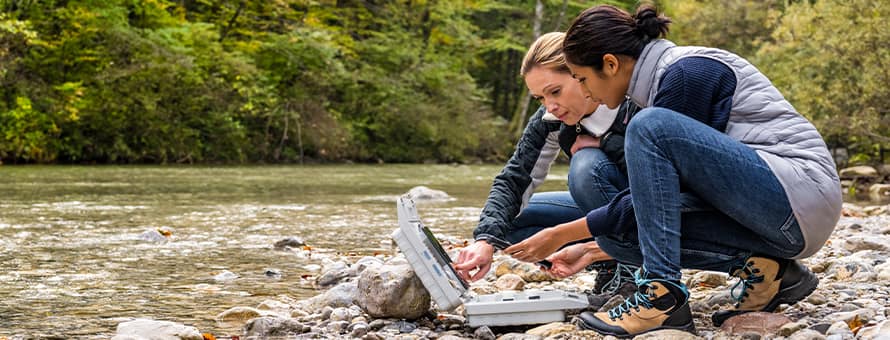What Can I Do with an Environmental Science Degree?

Understanding the Numbers
When reviewing job growth and salary information, it’s important to remember that actual numbers can vary due to many different factors — like years of experience in the role, industry of employment, geographic location, worker skill and economic conditions. Cited projections do not guarantee actual salary or job growth.
Environmental science is the study of learning how the natural world works, how we interact with it, and how we can preserve it. If you want to solve real world environmental problems and promote a sustainable planet, the study of environmental science is for you.
A true interdisciplinary major, a degree in environmental science includes the study of ecology, biology, chemistry and geology, according to Dr. Michele Goldsmith, professor of environmental and physical sciences for Southern New Hampshire University (SNHU). In addition to traditional coursework, an inquiry approach to learning is emphasized, as are experiential experiences and internships.
This combination of scientific knowledge and hands-on training allows you to customize your career and work to inspire change on a local and global scale in the way that best suits their interests and abilities.
Is Environmental Science a Good Degree?

If you want to make a positive impact on our world and develop sustainable practices, a career in environmental science could be a very good option for you. This degree provides a strong foundation for a career as a scientist. It’s also a major that includes building leadership and collaboration skills. Learning alongside others who share your passion for good works and preserving the world in which we live can make for a rewarding career.
In fact, one of the biggest benefits of a degree in environmental science is its multidisciplinary nature. By incorporating the study of science with coursework in data analysis, research strategies and field methods and technologies, you can truly take your career in any direction you wish.
“An environmental science degree is so versatile that the sky is the limit to what students can do with it,” said Dr. Kelly Thrippleton-Hunter, adjunct faculty of science at SNHU. In addition to teaching at SNHU, Dr. Thrippleton-Hunter serves as a health risk assessor at the New Hampshire Department of Environmental Services (NHDES). She holds a Ph.D. as well in Environmental Toxicology.
Just a few of the options available to people with a degree in environmental science include jobs monitoring fish, wildlife, and ecosystems, conducting economic analyses of natural resources or becoming a park ranger or game warden, according to Thrippleton-Hunter.
“The field continues to grow, so career opportunities and options will only continue to expand,” she said.
What Key Skills Are Needed for Success in Environmental Science?
There are several skills that lend themselves well to an environmental science career. One of those skills is a systems-thinking perspective. Because the natural environment is comprised of intricate systems, being a systems thinker is essential, according to Tyra Davey, associate dean of science at SNHU.
“It’s also important to be eager to learn and have a growth mindset,” she said.

Davey recommends talking to as many professionals in the field that you can to learn what it’s like to work in environmental science and how they got to where they are today. “This field is full of positive people who are eager to share what they’ve learned and will help you find your niche,” she said.
Communication skills are particularly helpful in STEM and scientific fields because of the need to connect with community and collaborate with others across all aspects of science. A willingness to ask questions and be inquisitive is just one way those communication skills will be useful.
“If you find yourself taking a critical look at the world around you, asking why or how about a lot of things, this could be a great field for you,” Davey said.
What Jobs Can I Get with an Environmental Science Degree?
If you're ready to look at the world in a questioning manner, then you may be ready to pursue a degree in environmental science. “That curiosity will open a host of professional opportunities to you,” said Goldsmith. Opportunities, according to the U.S. Bureau of Labor Statistics (BLS) such as:
- Climate Change Analyst. This is a role that could include educational outreach and grant writing in addition to studying the ecosystem.
- Environmental Health and Safety Specialist. This is a role that could include studying the various ways environmental factors can affect public health. This role also could have an educational outreach component.
- Industrial Ecologist. This is a role that studies the effects of industry on the environment. This role could involve analysis, research and collaboration with members of industry.
According to BLS, careers such as an environmental scientist or specialist, including those mentioned above, typically require a bachelor’s degree and have a median salary of $76,530 per year.*
Careers in environmental science span from teaching and research roles to roles in conservation to natural resource management and more. According to Thrippleton-Hunter, there are many options to consider with a degree in environmental science depending on your particular strengths and interests. She says:
- If you're technology-minded, you might consider careers in monitoring fish, wildlife, ecosystems or natural resources in real time using remote sensing and GIS data.
- If you enjoy math, a career conducting economic analyses to understand the use and disposal of natural resources could be a good fit for you.
- If you enjoy nature and the outdoors, a career as an environmental scientist, park ranger or game warden are good options.
According to Goldsmith, additional career options to consider include:
- Atmospheric scientist and meteorologist: With a median salary of $94,570 per year, according to BLS, this role includes the study, reporting and forecasting of the atmosphere, climate and weather.* While a research career typically needs a graduate degree, there are many opportunities requiring only a bachelor’s degree according to BLS.
- Conservation scientist and natural resource manager: With a median salary of $63,750 per year, according to BLS, this role includes working in the area of natural resources conservation or park and forestry management.* Careers are available in the nonprofit, private and government sectors.
- Environmental science and protection technicians: With a median salary of $47,370 per year, according to BLS, this role includes opportunities in consulting, laboratories and the enforcement of government regulations.* While an associate degree is the typical entry-level requirement for jobs in this field, a bachelor’s degree in environmental science can expand your career options, BLS reported.
And, of course, no discussion of environmental science would be complete without mentioning the importance of careers in climate change, which often fall under the umbrella of atmospheric scientists.
“With our continued focus on the quality of air and drinking water, on the impact of climate change, and on sustainable agriculture and green energy, the market in these areas is set to grow,” Thrippleton-Hunter said.
As you explore the many avenues available to you within the field of environmental science, remember that for most people in the profession, their careers were not linear. “You’ll find that your career winds and curves and maybe you’ll end up in a place you thought you’d never see yourself, but with the right mentors and our supportive scientific community, you can end up with your dream job,” Davey said.
The field of environmental science is growing precisely because there is a great need for this critical work. “It’s never been more important that we have highly skilled environmental professionals who are passionately advocating for the health of our planet,” Davey said.
A degree in environmental science is great training for a satisfying and impactful career. It's also the springboard to determining whether you're meant for a career that is hands on with fingers in the dirt, one that involves research in a laboratory or if you’re meant to educate the public about how they, too, can get involved with saving the planet.
Whether you choose to work in addressing climate change, become a research biologist or work in natural resource management, you will undoubtedly have a career helping others move forward in keeping the planet, and each other, healthy and well.
Discover more about SNHU’s environmental science degree: Find out what courses you’ll take, skills you’ll learn and how to request information about the program.
*Cited job growth projections may not reflect local and/or short-term economic or job conditions and do not guarantee actual job growth. Actual salaries and/or earning potential may be the result of a combination of factors including, but not limited to: years of experience, industry of employment, geographic location, and worker skill.
Marie Morganelli, Ph.D. is a freelance content writer and editor.
Explore more content like this article

What Can You Do With an Associate Degree in Information Technology?

How to Become a Software Engineer

What is Hour of Code? A Chance to Kickstart Your Coding Literacy
About Southern New Hampshire University

SNHU is a nonprofit, accredited university with a mission to make high-quality education more accessible and affordable for everyone.
Founded in 1932, and online since 1995, we’ve helped countless students reach their goals with flexible, career-focused programs. Our 300-acre campus in Manchester, NH is home to over 3,000 students, and we serve over 135,000 students online. Visit our about SNHU page to learn more about our mission, accreditations, leadership team, national recognitions and awards.

